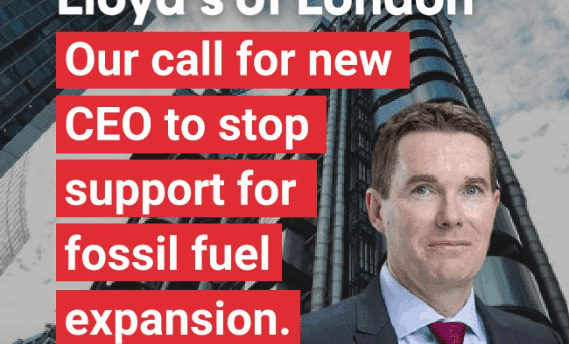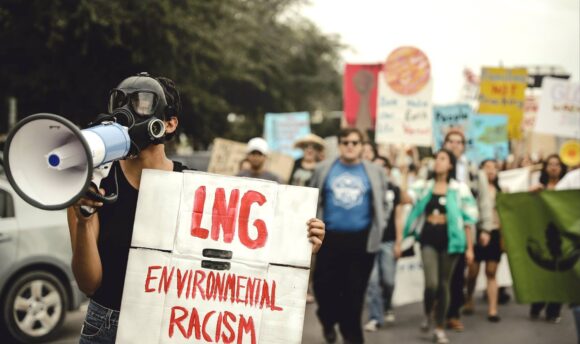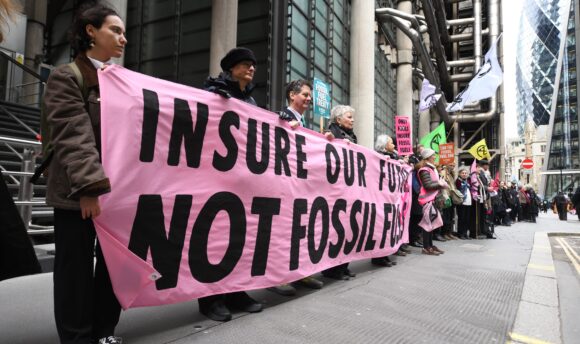22 NGOs, as part of the Insure Our Future network, sent the following letter to insurance and reinsurance company CEOs on April 15
DearMadam/Sir,
The climate crisis is escalating. In 2020 the planet experienced the warmest year on record (tied with 2016) as well as a record-breaking Atlantic hurricane season, a record number of climate disasters across Asia, unprecedented wildfires in Australia, California and Siberia and record floods in the Sahel and other parts of the world. Globally, natural disasters created losses of US$ 210 billion last year, US$ 82billionof which were insured.
To date, governments have proven unable to make the changes which climate science requires to address this escalating crisis. According to the IPCC’s 1.5°C report, CO2 emissions need to decline by about 45 per cent from 2010 to 2030 to be consistent with global emission pathways to the 1.5°C goal (with no or limited overshoot). Yet the UNFCCC recently concluded that the new and updated nationally determined contributions which governments have prepared for COP26 will only reduce CO2 emissions by 0.5 percent by 2030 compared with 2010.
The combustion of fossil fuels continues to be the primary cause of disastrous climate change. The latest Production Gap report, which UNEP and other institutions published in December 2020, found that the world needs to decrease fossil fuel production by approximately 6% per year between 2020 and 2030 –11% for coal, 4% for oil and 3% for gas respectively –to follow a 1.5°C-consistent pathway. Yet in contrast to this scientific conclusion governments plan to increase fossil fuel production by 2% per year.
The extraction, transport and combustion of fossil fuels not only has massive impacts on our climate, but also on public health and livelihoods. According to a recent peer-reviewed study, the burning of fossil fuels caused 8.7 million premature deaths in 2018. Like other social, environmental and climate-related impacts of the fossil fuel industry, these public health impacts affect poor and marginalized groups in society the most.
As society’s professional risk managers, insurance companies have access to the latest climate science. They warned about the risks of climate change as early as 1973 –almost 50 years ago. Today they must fully embrace the necessary transition from fossil fuels to renewable energy as risk managers, investors and corporate citizens.
In recent years leading insurance companies have reduced their exposure to coal and other fossil fuels. Currently, at least 26 major insurers have restricted insurance services for coal, and at least 70 have divested from the coal industry or ended new investments in the sector. Eleven insurers have restricted underwriting for tar sands projects, yet only one company has ended cover for all new oil and gas production.
In the face of a potentially unmanageable climate crisis, insurance companies need to expand and accelerate their actions to support the transition from fossil fuels to renewable energy. We call on you and your peers in the global insurance industry to take the following steps:
- Immediately cease insuring new and expanded coal, oil, and gas projects.
- Immediately cease insuring coal companies, unless they have a coal exit plan that commits to close all coal-related assets by 2030 in EU/OECD countries and by 2040 globally.
- Phase out, in line with a 1.5ºC pathway, insurance for oil and gas companies.
- Divest all assets, including assets managed for third parties, from coal, oil, and gas companies that are not aligned with a 1.5ºC pathway. Any company that is building new coal, oil, or gas expansion projects is not aligned with 1.5ºC.
- Bring stewardship activities, membership of trade associations and public positions as a shareholder and corporate citizen in line with a 1.5ºC pathway in a transparent way.
- Establish robust due diligence and verification mechanisms to ensure clients fully respect and observe all human rights, including the right to Free, Prior and Informed Consent (FPIC) as articulated in the UN Declaration on the Rights of Indigenous Peoples.
These policies should be applied by both insurance and reinsurance companies. Reinsurance companies should apply the coal policies to direct, facultative and treaty business.
TheInsureOur Future campaign is motivated by the quest for environmental justice. We would however like to point out that taking bold and urgent action on climate change is also in the financial self-interest of insurance companies and their shareholders.
In February 2020, Moody’s Investors Service concluded that insurers’ retreat from coal was “credit positive … as it protects them against potential climate change liability risk, and reduces the risk of their investment assets becoming ‘stranded’ –economically non-viable due to faster than expected transition to carbon-neutral alternatives.”
Fossil fuel exit policies also add value for shareholders because they can be considered a proxy for forward-looking management strategies. In an analyst report, Société Généralein December of last year concluded that “the insurance sector’s most important contribution to ESG is exiting coal underwriting”. The report priced the quality of insurers’ coal and ESG policies into their financial valuations, resulting in target price premiums of up to 6%.
We hope you will take the bold action that is required to address the climate crisis and ask you to respond to our letter by August 15, 2021.
Like every year, your response will form the basis of the Scorecard Report on Insurance, Fossil Fuels and Climate Change which theInsureOur Future campaign will publish towards the end of the year. Reclaim Finance, a member of theInsureOur Future network experienced in the analysis of fossil fuel policies, will share a detailed questionnaire, which will make it easier to respond to ourdemands, with your CSR staff in thefirst half of June.
We will be happy to engage with you and your staff on this topic and to answer any questions you may have. We look forward to your response.



